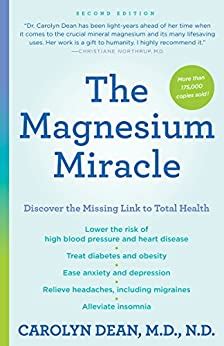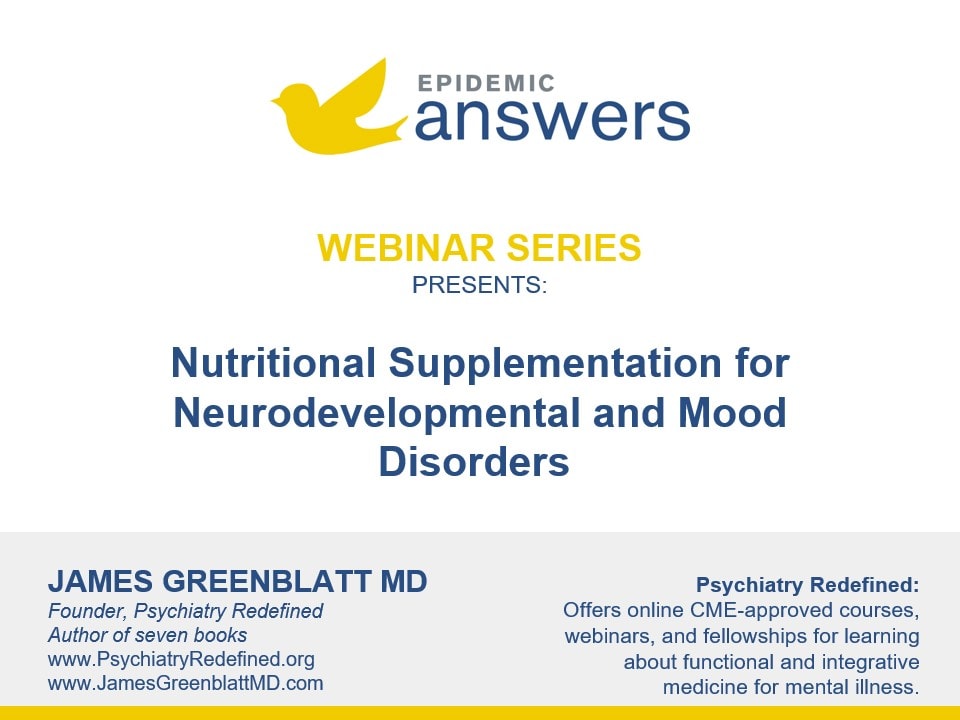In this blog post, Kelly Dorfman teaches us about the importance of magnesium, symptoms of deficiency and how to correct it.
Magnesium is perhaps one of the most necessary minerals for healing and recovery. Here’s a short list of its benefits; it can:
- Reduce anxiety
- Promote sleep
- Relieve muscle cramps and twitches
- Reduce sensitivity to lights and sounds
- Reduce feelings of stress and overwhelm
- Stop an asthma attack
- Pull toxins out of the body
- Increase circulation
- Decrease joint pain
- Relieve constipation
Magnesium is the eighth most plentiful element on the planet and the fourth most abundant mineral in the body. It is essential for a very wide gamut of critical body functions, affecting virtually every organ system.
Why Is Magnesium Important in Chronic Illnesses?
Magnesium is directly responsible for over 300 biochemical bodily reactions, many of which have gone awry in children with autism, attention issues, Sensory Processing Disorder, other developmental delays and just about any chronic illness.
Magnesium is extremely important in the metabolism of fellow elements: cadmium, calcium, copper, iron, phosphorus, potassium, lead, sulfur and zinc, and it is the single most important mineral for maintaining proper electrical balance and facilitating smooth metabolism in the cells. One of the major properties of it is that of stabilizing cell membranes. The health status of the digestive system and the kidneys significantly influence its status, as it is absorbed in the intestines and then transported through the blood to cells and tissues.
Signs of Deficiency
Below are common signs of deficiency:
- Constipation
- Hypersensitivity to loud and high-pitched sounds
- Irritability
- Muscle cramps and twitches
- Insomnia
- Cold hands and feet
- Carbohydrate cravings
- Numbness and tingling
- Inability to inhale deeply
Causes of Deficiency
Magnesium deficiency is most likely in those who eat many processed foods, overcook foods and drink soft water. There are two main causes of magnesium deficiency: stress and sugar. During times of stress, certain hormones such as cortisol trigger the excretion of greater-than-normal levels of magnesium in their urine. Just remember that stress burns magnesium, and that people with adrenal fatigue or constant exhaustion likely have very low levels of magnesium.
Similarly, sugar is likely the most inflammatory food around and thus necessitates high amounts of cortisol to manage the inflammation. Remember that refined, processed carbohydrates convert quickly to sugar, so these foods should be minimized.
Deficiencies can also develop when elimination is increased by taking medications and products such as:
- Diuretics
- Birth control
- Corticosteroids
- Anti-psychotic
- Alcohol
- Caffeine
- Sugar
Because in certain forms this mineral is not easily absorbed and because no classical symptoms exist that point to its causal role in disease, the problem of deficiency is very readily masked. Ask your healthcare practitioner to confirm your suspicions with blood and/or urine testing.
Before seeking out a medical diagnosis, think “magnesium deficiency.” Instead of reaching for asthma medication, arthritis drugs or a laxative, try some magnesium, the super mineral.
Corrective Steps
Eat High-Density Foods
Foods high in magnesium are:
- Avocados
- Beans
- Molasses
- Almonds
- Brazil nuts
- Cashews
- Pumpkin seeds
- Sunflower seeds
- Whole grains
- Fish
- Kiwis
- Leafy greens, especially spinach
Organic versions of these foods, especially produce, typically have higher levels of this and other minerals.
Supplement Orally
Magnesium citrate, magnesium glycinate, magnesium malate and magnesium threonate are some of the best absorbed forms when taken orally. Magnesium citrate is taken to bowel tolerance, meaning it can loosen the bowels and relieve symptoms of constipation. magnesium glycinate does not have this effect. Magnesium threonate has been shown to cross the blood-brain barrier and may thus help more with neurological symptoms.
Read labels carefully, always looking for the number of milligrams of elemental magnesium in the tablet or capsule. Recommended daily allowance (RDA) is four milligrams of magnesium daily per pound of body weight (e.g., 160 mg for a 40-pound child).
Magnesium metabolism has a quirk: if levels are low enough to cause symptoms, the deficiency can cause the body to lose its ability to use what it takes in orally. Only a third to a half of dietary magnesium is absorbed into the body.
In the late 1960s, Dr. Bernard Rimland showed the beneficial effects of supplemental magnesium given along with vitamin B6 to improve its absorption in individuals with autism.
Supplement Transdermally
Bypassing the digestive tract with transdermal bath salts or creams can solve the problem with oral ingestion.
Bath Salts
Epsom salts, which are magnesium sulfate, can help both with magnesium supplementation and with sulfation. Their tendency to dry out and become “powdery” on the skin may limit absorption. Pour one cup of Epsom salts into a tub of warm water, soaking for approximately 30 minutes per day.
Magnesium chloride bath flakes, also known as Dead Sea salts, are hydroscopic, meaning they attract water, thus staying wet on the skin, where they are more likely to be absorbed.
Magnesium Oil
Magnesium oil delivers high levels of magnesium directly through the skin to the cellular level, bypassing common intestinal and kidney symptoms sometimes associated with oral use. This oil feels “oily” on the skin, but it can also be very itchy, so test on a small area of skin first. The biggest benefit of topical magnesium chloride administration is that the intestines are not adversely impacted.
Magnesium Gel
Magnesium gel is magnesium chloride in an all natural, polysaccharide gelling agent that can retain its qualities in hot or cold conditions, and it has almost unlimited shelf-life stability. It has a rich, luxurious feel, slides like silk and is great for holding the mineral on the skin while the body drinks up the magnesium.
About Kelly Dorfman MS LND
Kelly Dorfman is one of the world’s foremost experts on using nutrition therapeutically to improve brain function, energy and mood. Kelly’s special talent for integrating information from many sources and finding practical solutions has made her a popular speaker and workshop leader. She lectures extensively and is a member of Platform (formerly the National Speakers Association) and has been featured on numerous television programs including CNN’s American Morning.
Kelly’s award winning book, Cure Your Child With Food: The Hidden Connection Between Nutrition and Childhood Ailments (formerly known as What’s Eating Your Child) was given rave reviews by Publishers Weekly and the Washington Post.

As a go-to expert on nutrition issues, Kelly is frequently interviewed and quoted in the media. She has been featured in articles in The Wall Street Journal, Parade, Bethesda magazine, Living Without magazine, and the Huffington Post.
Kelly holds a master’s degree in nutrition/biology and is a licensed nutrition dietitian. She is a co-founder of Developmental Delay Resources, which has merged with Epidemic Answers. You can find out more about Kelly and her practice at kellydorfman.com
Still Looking for Answers?
Visit the Epidemic Answers Practitioner Directory to find a practitioner near you.
Join us inside our online membership community for parents, Healing Together, where you’ll find even more healing resources, expert guidance, and a community to support you every step of your child’s healing journey.
Sources & References
Boyle, N.B., et al. The Effects of Magnesium Supplementation on Subjective Anxiety and Stress-A Systematic Review. Nutrients. 2017 Apr 26;9(5):429.
Essential elements in depression and anxiety. Part I. Pharmacol Rep. 2014 Aug;66(4):534-44.
Sartori, S.B., et al. Magnesium deficiency induces anxiety and HPA axis dysregulation: modulation by therapeutic drug treatment. Neuropharmacology. 2012 Jan;62(1):304-12.
Resources
Books
Dean, Carolyn, MD ND. The Magnesium Miracle: Discover the Missing Link to Total Health. Ballantine Books, 2017.




